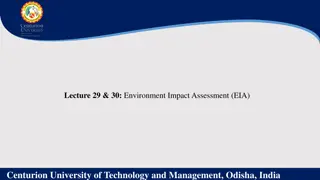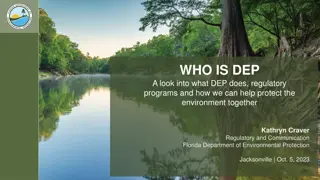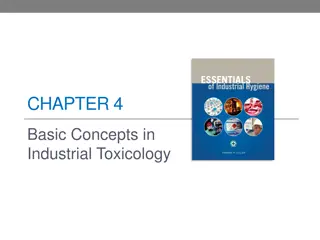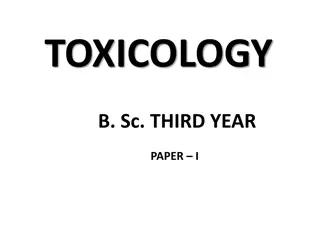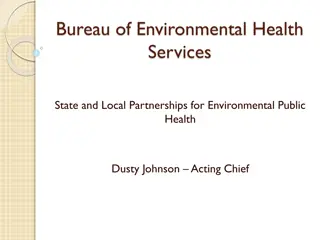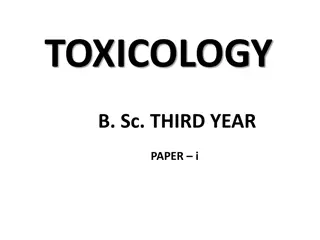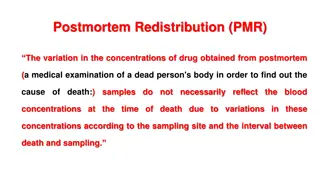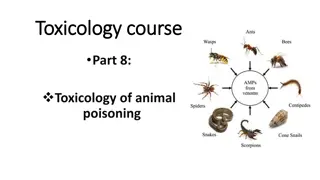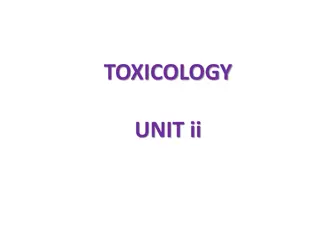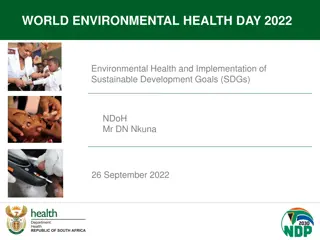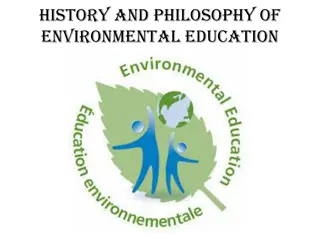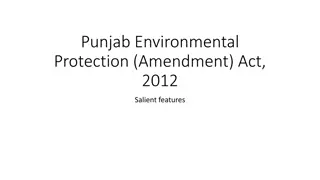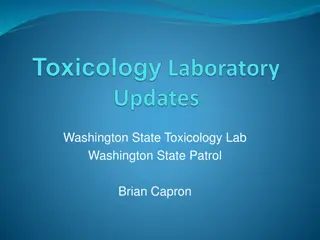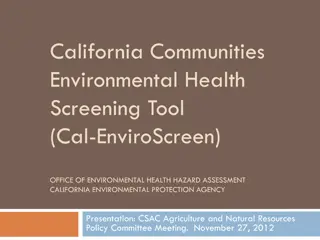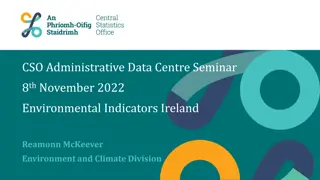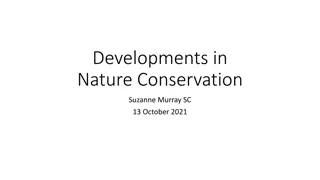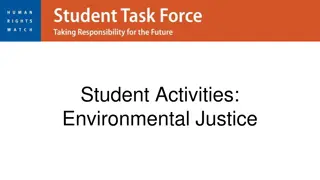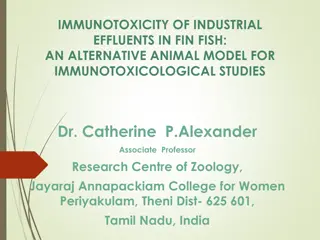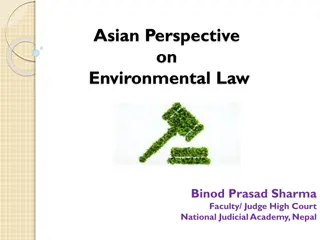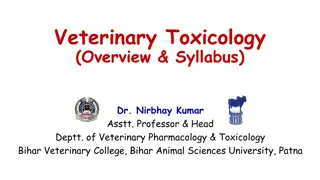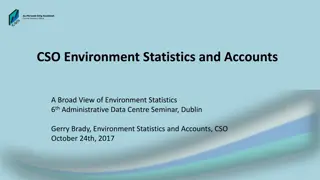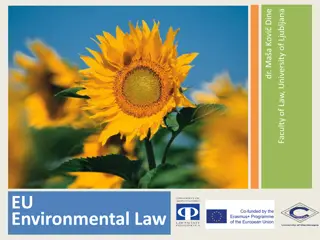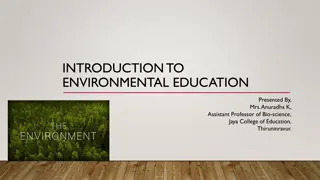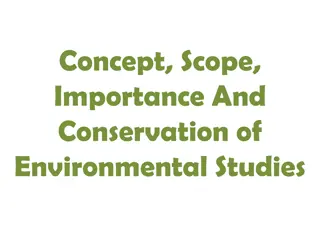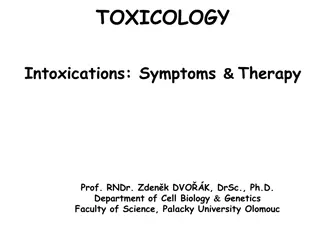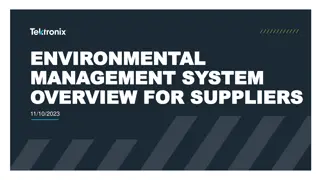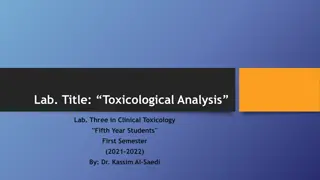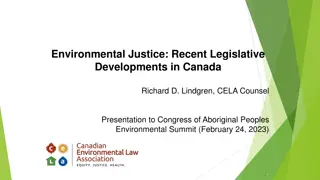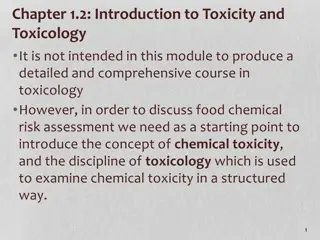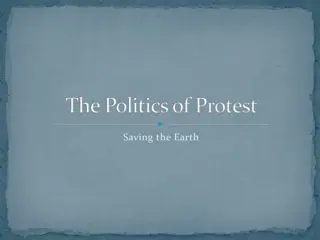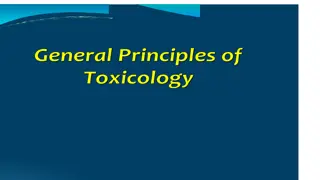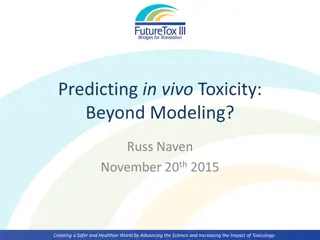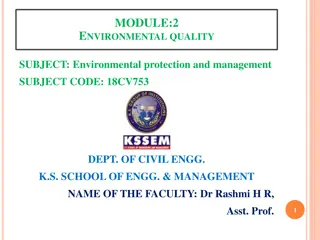Environmental Impact Assessment (EIA) Evolution and Importance at Centurion University
The Environmental Impact Assessment (EIA) process evaluates the environmental impacts of proposed projects, aiming to minimize adverse effects. Originating in the 1970s, EIA has evolved globally, becoming a key policy tool for sustainable development. In India, EIA began in 1976-77 and was later mad
0 views • 4 slides
Understanding the Role of Florida Department of Environmental Protection
The Florida Department of Environmental Protection (DEP) is dedicated to managing and safeguarding the state's air, water, and land resources. With a vision to be a global leader in environmental protection and a mission to enforce environmental laws and preserve natural resources, DEP focuses on ed
4 views • 20 slides
Understanding Basic Concepts in Industrial Toxicology
Industrial toxicology is a vital field that studies the effects of various agents on organism health through mechanisms of action, toxicokinetics, and more. It explores toxic chemical absorption, distribution, metabolism, and elimination, as well as toxic effects on major organ systems. Learn about
0 views • 35 slides
Understanding Toxicology: Dose-Response and Toxicity Assessment
The study of toxicology involves understanding dose-response relationships, lethal concentrations, tolerance limits, toxicity curves, and factors influencing toxicity. Dose, response, acute toxicity, chronic toxicity, LD50, and ED50 are key concepts in toxicology that help assess the effects of chem
2 views • 24 slides
Bureau of Environmental Health Services: Overview and Programs
The Bureau of Environmental Health Services (BEHS) is dedicated to promoting public health through various environmental programs and services. Led by Acting Chief Dusty Johnson, BEHS manages food safety operations, lodging inspections, environmental child care, emergency response activities, and mo
0 views • 23 slides
Making Informed Decisions in Environmental Science
Values play a crucial role in environmental decision-making. Scientific research is essential in addressing environmental issues, but understanding values is necessary before research can begin. This article discusses how values impact environmental decision-making and introduces an environmental de
0 views • 22 slides
Introduction to Toxicology: Science and Impact on Living Organisms
Toxicology is the study of adverse effects of chemicals on living organisms. It assesses probability of occurrence, quantitatively and qualitatively analyzing toxic effects. Toxicants are agents causing harmful responses in biological systems. Environmental toxicology focuses on pollutants' effects
0 views • 12 slides
Understanding Postmortem Redistribution in Forensic Toxicology
Postmortem Redistribution (PMR) refers to the variation in drug concentrations obtained from postmortem samples, which may not accurately reflect the levels at the time of death due to redistribution mechanisms. In forensic toxicology, assessing drug severity relies on blood concentrations, with cha
0 views • 16 slides
Understanding Animal Venom and Snake Classification in Toxicology
Animal venom, particularly snake venom, contains various toxins that can have detrimental effects on the body. Different types of snake venom target specific systems, such as neurotoxic venom affecting neuromuscular junctions and hemotoxic venom impacting the cardiovascular system. Understanding the
4 views • 27 slides
Overview of Toxicology: Understanding Chemical Risks and Health Impacts
Toxicology is a crucial field that assesses the effects of various toxic substances on human health and the environment. From heavy metals to solvents, radiation, pesticides, and animal toxins, this discipline plays a vital role in identifying and managing risks associated with exposure to harmful c
0 views • 25 slides
Environmental Health and Sustainable Development Goals - NDoH Presentation
On World Environmental Health Day 2022, Mr. DN Nkuna from NDoH presented on the strategic alignment of environmental health to SDGs. The purpose was to share departmental activities progressing towards SDGs, highlighting environmental health's role in achieving them. Background information emphasize
0 views • 21 slides
Evolution of Environmental Education: From Rousseau to International Recognition
Environmental education has roots dating back to the 18th century with scholars like Rousseau and Agassiz emphasizing nature-centric education. The formalization of environmental education began in 1968 with the UNESCO Biosphere Conference, leading to global awareness and action for environmental co
0 views • 33 slides
Enhancing Judicial Capacity for Environmental Law: Curriculum and Challenges
Environmental law curriculum for judicial education emphasizes the importance of knowledge and expertise in handling environmental justice issues. Prerequisites include competent rule of law, mature judicial system, independent bar, and well-equipped enforcement agencies. To address challenges faced
0 views • 18 slides
Environmental Education: Origins, Evolution, and Significance
Environmental education is a process that fosters awareness, knowledge, attitudes, and skills to address environmental challenges. It has roots in humanity's relationship with nature and has evolved through various movements and international initiatives. The history of environmental education inclu
0 views • 12 slides
Environmental Protection Act Amendments in Punjab 2012
The Punjab Environmental Protection Act Amendments of 2012 introduced key provisions such as the establishment of Provincial sustainable development funds, wildlife conservation, environmental tribunals, and promotion of public awareness. The Act empowers authorities to inspect places suspected of e
0 views • 4 slides
Toxicology Laboratory Updates and Certifications
The Washington State Toxicology Lab, under the Washington State Patrol, has recent staffing updates, including new hires and return of staff on maternity leave. Updates on validated methods and toxicologist certifications are provided, showcasing the lab's commitment to quality and accuracy. A new t
0 views • 26 slides
California Communities Environmental Health Screening Tool (Cal-EnviroScreen) Overview
California Communities Environmental Health Screening Tool, known as Cal-EnviroScreen, is a program that focuses on environmental justice, aiming to ensure fair treatment for all individuals concerning environmental laws. The initiative addresses concerns related to cumulative impacts of pollution o
0 views • 27 slides
Environmental Indicators Report Ireland 2022 Overview
The Environmental Indicators Report for Ireland 2022 provides a detailed analysis across various domains including Global Context, Environmental Economy, Greenhouse Gases, and Climate Change. Key findings highlight trends in environmental indicators, data collection methods, and significant statisti
1 views • 13 slides
Legal Questions Surrounding Environmental Impact Assessment in Recent Conservation Developments
Recent developments in nature conservation, focusing on a legal case involving Eco Advocacy v. An Bord Pleanala from 2021. The case revolves around the European Union laws and the Environmental Impact Assessment directive, questioning the procedures and requirements for assessing environmental impac
0 views • 38 slides
Understanding Environmental Justice and Student Activities
Engage students in learning about environmental justice through classroom presentations with interactive activities. The slideshow provides instructions for student presenters, tips for successful public speaking, and an introduction to environmental justice. Explore the concept of environmental jus
0 views • 26 slides
Overview of Environmental Impact Assessment and Strategic Environmental Assessment Directives
Environmental Impact Assessment (EIA) and Strategic Environmental Assessment (SEA) play crucial roles in evaluating the impact of planned activities on the environment. This content delves into the concept, origins, development, and key elements of environmental assessment, discussing the legal fram
2 views • 35 slides
Understanding Immunotoxicity in Fish: An Alternative Model for Toxicological Studies
The study explores the immunotoxic effects of industrial effluents on fin fish, highlighting xenobiotics' impact on the immune system. It discusses the sensitivity of the immune system to environmental toxins and the elicitation of immune reactions by various substances. The importance of fish as a
0 views • 25 slides
Perspectives on Environmental Law in South Asia
The judiciary in South Asian countries like India, Pakistan, and Bangladesh plays a vital role in upholding environmental justice and promoting sustainable development. These judiciaries have interpreted constitutional rights to include a healthy environment, leading to landmark decisions that integ
0 views • 15 slides
Overview of Veterinary Toxicology Syllabus and Topics Covered
Detailed overview of the Veterinary Toxicology syllabus including general toxicology, toxicity caused by metals and non-metals, poisonous plants, agrochemical toxicity, fungal and bacterial toxins, venomous bites and stings, and more. The syllabus covers a wide range of topics related to toxicology
0 views • 12 slides
Eurostat Environmental Economic Accounts and Statistics Overview
The presentation discusses Eurostat's Environmental Economic Accounts and Statistics, outlining modules, questionnaire details, methodological approach, and statistical collaboration. Key topics include air emission accounts, environmental taxes, material flow accounts, and more. The focus is on ach
2 views • 19 slides
Overview of EU Environmental Law and Objectives
Dr. Maa Kovi Dine, a Faculty of Law member at the University of Ljubljana, specializes in EU Environmental Law. The European Union aims to establish an internal market while ensuring balanced economic growth, environmental protection, and social progress. EU has exclusive, shared, and supportive com
0 views • 20 slides
Role of Environmental INGOs in International Law Development
Non-state actors, particularly Environmental International Non-Governmental Organizations (EINGOs), have played a crucial role in developing international environmental law over the past few decades. INGOs emerged due to government inaction in addressing environmental degradation, mobilizing public
0 views • 84 slides
Understanding Environmental Education: Concepts, Importance, and Scope
Environmental education is crucial in addressing the imbalance in nature caused by human activities. It aims to increase awareness about environmental issues, the impact of human actions, and effective ways to manage ecosystems. This introduction delves into the meaning and definition of environment
0 views • 23 slides
Understanding Environmental Studies: Concepts, Scope, Importance, and Conservation
Environmental studies encompass the broad understanding of the environment, including its definition, ecology, ecosystems, environmental segments, and the multidisciplinary nature of environmental science. The scope and importance of environmental studies highlight the interconnectedness of living o
0 views • 27 slides
Understanding Pharmacology and Toxicology in Investigator Brochures
Explore the essential aspects of pharmacology and toxicology covered in Investigator Brochures, including nonclinical information, safety pharmacology, general toxicology, genetic toxicology, and more. Learn about the significance of pharmacology in predicting intended and unintended effects, consid
1 views • 40 slides
Overview of Toxicology: Intoxications, Symptoms, and Therapy
Understanding toxicology is crucial to dealing with various types of intoxications, including accidental, foodborne, inhalation, industrial, and intentional exposures. Symptoms of toxic exposure can vary widely, affecting different body systems such as the cardiovascular, respiratory, and nervous sy
0 views • 9 slides
Environmental Management System Overview for Suppliers at Beaverton Campus
Suppliers, vendors, and contractors at the Beaverton Campus are required to undergo Environmental Management System (EMS) training to understand their potential environmental impacts and contribute to maintaining environmental performance objectives. The training covers significant environmental asp
0 views • 12 slides
Analytical Toxicology: Techniques and Sample Analysis in Clinical Toxicology
Analytical toxicology involves the observation, identification, and measurement of foreign compounds in biological and other samples, such as urine, blood, stomach contents, nails, hair, and DNA. Various techniques are used to isolate and identify drugs and poisons present in these samples. This fie
0 views • 12 slides
Recent Legislative Developments in Environmental Justice in Canada
Presentation by Richard D. Lindgren at the Congress of Aboriginal Peoples Environmental Summit discusses the concept of Environmental Justice (EJ), recent parliamentary initiatives in Canada related to EJ, and the Law Commission of Ontario's project on updating the Environmental Bill of Rights. It a
0 views • 16 slides
Introduction to Toxicity and Toxicology in Food Chemical Risk Assessment
This module introduces the concept of chemical toxicity and the discipline of toxicology in relation to food chemical risk assessment. It touches upon historical aspects, such as the case of Socrates' death by hemlock, the contributions of Mathieu Joseph Bonaventure Orfila in forensic toxicology, an
0 views • 18 slides
The Evolution of Environmental Activism in the United States
The journey of environmental activism in the United States began with Rachel Carson's groundbreaking book "Silent Spring" in 1962, which raised awareness about the dangers of pesticides like DDT. This led to the establishment of organizations such as the Environmental Defense Fund and the celebratio
0 views • 11 slides
Understanding Toxicology and Measures of Toxicity
Toxicology is the study of the adverse effects of chemicals on living organisms, involving xenobiotics and poisonous substances. Toxicologists examine the nature of these effects, testing in lab animals for measures of toxicity such as mortality, teratogenicity, carcinogenicity, and mutagenicity. Ke
0 views • 18 slides
Advancing In Vivo Toxicity Prediction Beyond Modeling
Explore the challenges and opportunities in predicting in vivo toxicity beyond traditional models. Learn about confidence in toxicity prediction, recently discontinued drugs due to safety concerns, and the importance of recognizing toxicological signals in preclinical stages. Discover how computatio
0 views • 27 slides
Environmental Quality Management and Objectives
This content delves into the importance of environmental protection and management, focusing on standards, pollution control, cleaner production, environmental strategy, and the objectives of environmental quality management. It emphasizes the need for compliance with regulations, minimizing environ
0 views • 92 slides
Understanding Food and Nutritional Toxicology
Food and nutritional toxicology delve into the science of poisons, toxins, and toxicants found in food. It covers substances harmful to consumers, including natural toxicants, contaminants, and additives. Nutritional toxicology focuses on the overlap between nutrition and toxicology, exploring the i
0 views • 17 slides
